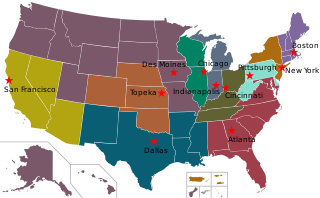The Federal Housing Administration (FHA) is a United States government agency created in part by the National Housing Act of 1934. The FHA sets standards for construction and underwriting and insures loans made by banks and other private lenders for home building. The goals of this organization are to improve housing standards and conditions, provide an adequate home financing system through insurance of mortgage loans, and to stabilize the mortgage market. The Commissioner of the FHA is Brian Montgomery.

In finance, default is failure to meet the legal obligations of a loan, for example when a home buyer fails to make a mortgage payment, or when a corporation or government fails to pay a bond which has reached maturity. A national or sovereign default is the failure or refusal of a government to repay its national debt.

The Federal National Mortgage Association (FNMA), commonly known as Fannie Mae, is a United States government-sponsored enterprise (GSE) and, since 1968, a publicly traded company. Founded in 1938 during the Great Depression as part of the New Deal, the corporation's purpose is to expand the secondary mortgage market by securitizing mortgage loans in the form of mortgage-backed securities (MBS), allowing lenders to reinvest their assets into more lending and in effect increasing the number of lenders in the mortgage market by reducing the reliance on locally based savings and loan associations. Its brother organization is the Federal Home Loan Mortgage Corporation (FHLMC), better known as Freddie Mac. As of 2018, Fannie Mae is ranked #21 on the Fortune 500 rankings of the largest United States corporations by total revenue.
Debt restructuring is a process that allows a private or public company, or a sovereign entity facing cash flow problems and financial distress to reduce and renegotiate its delinquent debts to improve or restore liquidity so that it can continue its operations.

The Federal Home Loan Banks are 11 U.S. government-sponsored banks that provide reliable liquidity to member financial institutions to support housing finance and community investment. With their members, the FHLBanks represents the largest collective source of home mortgage and community credit in the United States.

A collateralized debt obligation (CDO) is a type of structured asset-backed security (ABS). Originally developed as instruments for the corporate debt markets, after 2002 CDOs became vehicles for refinancing mortgage-backed securities (MBS). Like other private label securities backed by assets, a CDO can be thought of as a promise to pay investors in a prescribed sequence, based on the cash flow the CDO collects from the pool of bonds or other assets it owns. Distinctively, CDO credit risk is typically assessed based on a PD derived from ratings on those bonds or assets. The CDO is "sliced" into "tranches", which "catch" the cash flow of interest and principal payments in sequence based on seniority. If some loans default and the cash collected by the CDO is insufficient to pay all of its investors, those in the lowest, most "junior" tranches suffer losses first. The last to lose payment from default are the safest, most senior tranches. Consequently, coupon payments vary by tranche with the safest/most senior tranches receiving the lowest rates and the lowest tranches receiving the highest rates to compensate for higher default risk. As an example, a CDO might issue the following tranches in order of safeness: Senior AAA ; Junior AAA; AA; A; BBB; Residual.
Bank of America Home Loans is the mortgage unit of Bank of America. In 2008, Bank of America purchased the failing Countrywide Financial for $4.1 billion. In 2006, Countrywide financed 20% of all mortgages in the United States, at a value of about 3.5% of United States GDP, a proportion greater than any other single mortgage lender.

A commercial mortgage is a mortgage loan secured by commercial property, such as an office building, shopping center, industrial warehouse, or apartment complex. The proceeds from a commercial mortgage are typically used to acquire, refinance, or redevelop commercial property.

The Icesave dispute was a diplomatic dispute that began after the privately owned Icelandic bank Landsbanki was placed in receivership on 7 October 2008. As Landsbanki was one of three systemically important financial institutions in Iceland to go bankrupt within a few days, the Icelandic Depositors' and Investors' Guarantee Fund (Tryggingarsjóður) had no remaining funds to make good on deposit guarantees to foreign Landsbanki depositors who held savings in the Icesave branch of the bank.
The United States subprime mortgage crisis was a nationwide financial crisis, occurring between 2007 and 2010, that contributed to the U.S. recession of December 2007 – June 2009. It was triggered by a large decline in home prices after the collapse of a housing bubble, leading to mortgage delinquencies and foreclosures and the devaluation of housing-related securities. Declines in residential investment preceded the recession and were followed by reductions in household spending and then business investment. Spending reductions were more significant in areas with a combination of high household debt and larger housing price declines.
The subprime mortgage crisis impact timeline lists dates relevant to the creation of a United States housing bubble and the 2005 housing bubble burst and the subprime mortgage crisis which developed during 2007 and 2008. It includes United States enactment of government laws and regulations, as well as public and private actions which affected the housing industry and related banking and investment activity. It also notes details of important incidents in the United States, such as bankruptcies and takeovers, and information and statistics about relevant trends. For more information on reverberations of this crisis throughout the global financial system see Financial crisis of 2007–2008.
The Icelandic New Business Venture Fund is an independent company owned by the Icelandic government. It began operations in 1998 after a 1997 reorganization of the banking sector of Iceland. The organization is supervised by the Ministry of Industry and Commerce. Its purposes are strengthening the economy of Iceland and increasing its internationalization. Some of the organization's activities included helping to start Icelandic New Energy and providing start-up capital to companies. It was founded with a budget of ISK 5 billion. However, the organization was not a major success and made few notable accomplishments.

The federal takeover of Fannie Mae and Freddie Mac was the placing into conservatorship of the government-sponsored enterprises (GSEs) Federal National Mortgage Association and Federal Home Loan Mortgage Corporation by the U.S. Treasury in September 2008. It was one of the financial events among many in the ongoing subprime mortgage crisis.
The U.S. central banking system, the Federal Reserve, in partnership with central banks around the world, took several steps to address the subprime mortgage crisis. Federal Reserve Chairman Ben Bernanke stated in early 2008: "Broadly, the Federal Reserve’s response has followed two tracks: efforts to support market liquidity and functioning and the pursuit of our macroeconomic objectives through monetary policy." A 2011 study by the Government Accountability Office found that "on numerous occasions in 2008 and 2009, the Federal Reserve Board invoked emergency authority under the Federal Reserve Act of 1913 to authorize new broad-based programs and financial assistance to individual institutions to stabilize financial markets. Loans outstanding for the emergency programs peaked at more than $1 trillion in late 2008."

The Icelandic loan guarantees referendum, also known as the Icesave referendum, was held in Iceland on 6 March 2010.
The Great Recession in the United States was a severe financial crisis combined with a deep recession. While the recession officially lasted from December 2007 to June 2009, it took several years for the economy to recover to pre-crisis levels of employment and output. This slow recovery was due in part to households and financial institutions paying off debts accumulated in the years preceding the crisis along with restrained government spending following initial stimulus efforts. It followed the bursting of the housing bubble, the housing market correction and subprime mortgage crisis.

The financial crisis of 2007–2008, also known as the global financial crisis and the 2008 financial crisis, is considered by many economists to have been the most serious financial crisis since the Great Depression of the 1930s.
Iceland joined the International Monetary Fund on Dec 27th 1945, becoming one of the IMF’s founding members. As a part of the IMF, Iceland has rights in accordance with its contributions, borrowing rights which help facilitate the stability of global financial markets. Iceland’s quota is 321.8 million SDR, and its Special Drawing Rights are 112 million. This is a relatively small quota and its vote share comprises only 0.09% of all IMF vote shares, or 4,683 votes to be exact.








